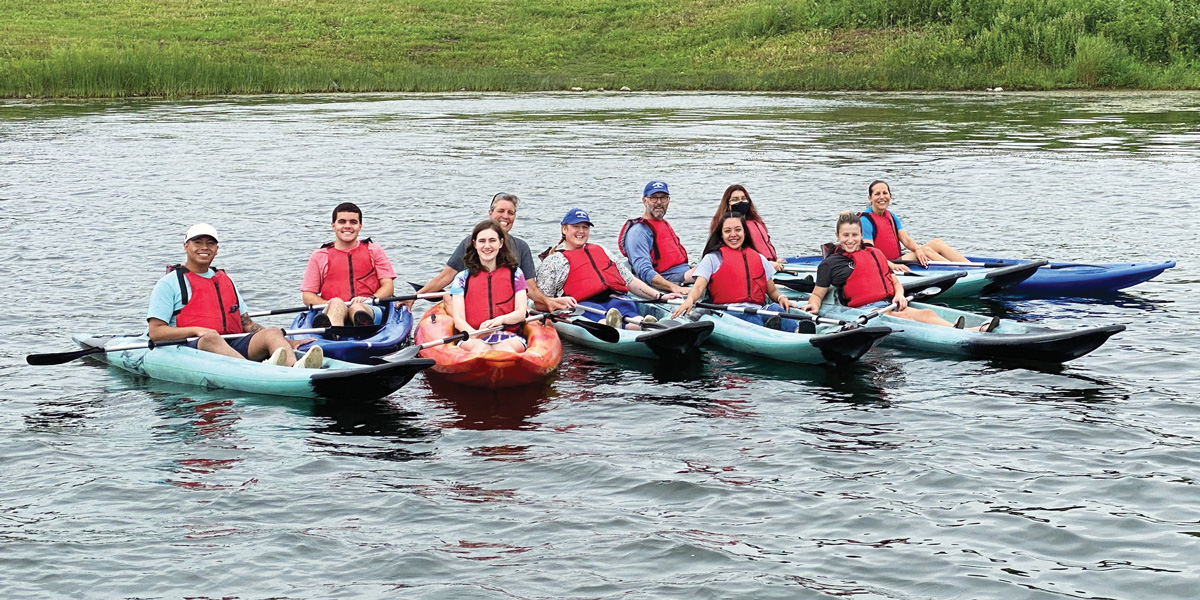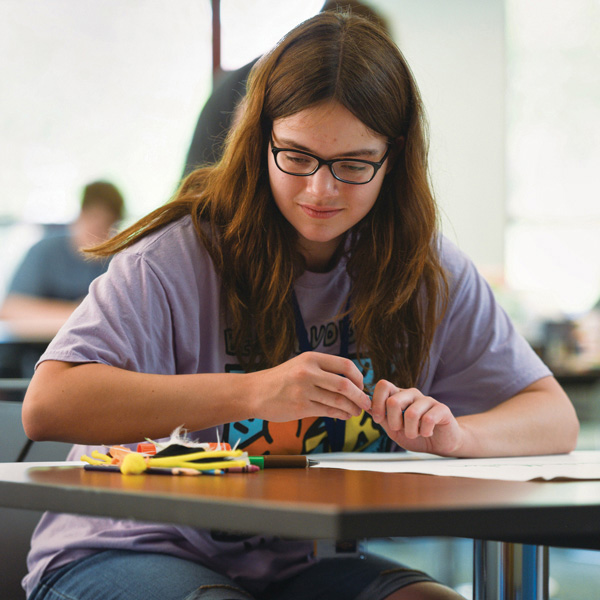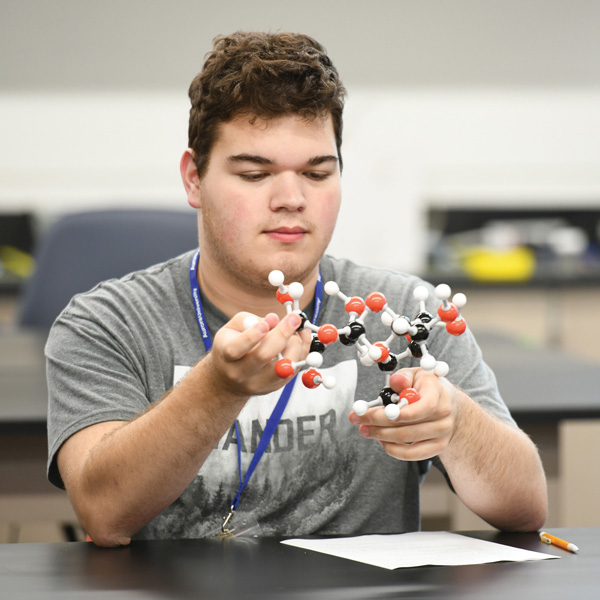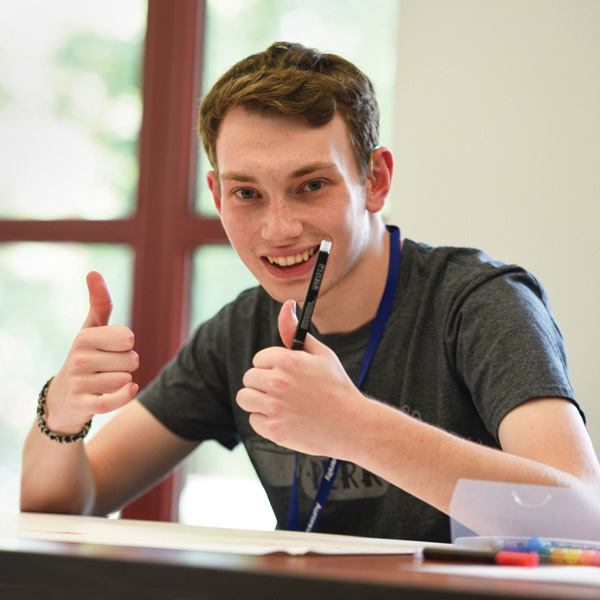Pathways Summer Camp Brings College to Life for Students on the Autism Spectrum

When the first Pathways summer camp for college-bound high school students on the autism spectrum was coming to a close, Brianne Jonathan ’11, MA ’15 walked across campus with one of the quieter students. The teenager stopped, looked at her, and said, “Brianne? I really liked camp. It made me feel like I’m part of the AU family.”
As director of Aurora University’s autism initiative and Pathways program, Jonathan was elated. AU’s campus has always felt like home to her — as a student, a PhD candidate, and now as the chief architect behind a new program to help students with autism spectrum disorder reach their potential in their studies and their careers.
Jonathan’s prime goal for the Pathways summer camp, which kicked off in July, was to create a welcoming environment that allowed students to get a taste of what it is like to go to college. She recruited faculty, staff, and students from across the university to work with the teenage campers. The entire campus came together to mentor, teach, and welcome them.
“Building familiarity is so important,” Jonathan said, adding that change is especially challenging for individuals on the autism spectrum. “The idea is to take an abstract concept that teenagers in high school are hearing about — going to college — and give them an authentic experience. The fact that these students felt at home in such a short time was amazing.”
Boost in Confidence
Pathways is a new, multifaceted initiative at AU that helps students on the autism spectrum who have a long-term interest in seeking a college degree to take their first steps toward college. The Pathways summer camp, which gives a preview of college, is designed to build students’ confidence so that they can thrive in class, graduate, and find a fulfilling career.

Before attending the Pathways summer camp, high school senior Ainsley Martin had been searching for a university. It has been an anxious time for her mother, Diane Stedman Conrad, a music educator who for years has helped her daughter through school. But Conrad was unsure about college — whom could she trust?
When she heard about AU’s Pathways, Conrad was relieved to discover a program that would prepare her daughter for success in college. Martin attended the Pathways summer camp in July and returned home invigorated.
“I learned some things about Russian history,” said Martin, who hopes to major in history and museum studies. “And I learned how to think from other people’s perspective and how to manage my time at college. We got to have the best experience.”
The Unwritten Rules
There were two camp sessions in July. The younger high school students attended a day camp for two weeks. The older students lived on campus for 10 days — experiencing life in a residence hall, eating in a dining hall, learning how to do laundry, and practicing other life skills.

At both camps, students attended classes in history, technology, art, music, and college preparation. They received guidance on some of the unwritten rules of the classroom. For example, students were informed to keep paying attention until class is over — no packing up early.
Outside of the classroom, they learned how to relate socially with one another, skills that many students had lost during the pandemic. They kayaked, sang karaoke, and even visited the Shedd Aquarium and Millennium Park in Chicago together. They also took part in social activities such as yoga, nature walks, bowling, kayaking, a labyrinth walk, and theatre improvisation. The campers made new friends and connections.
When we have supports in place to decrease the anxiety and frustration that exists because of the challenges of autism spectrum disorder, it opens up a path for their strengths to rise.Pathways Director Brianne Jonathan
Jodi Kastner and her son Ethan Tooby — who graduated from high school in 2020 — had been looking for a way to get comfortable with the idea of going to college. The Pathways summer camp, Kastner said, offered a chance to do just that.

“When you have a child who has special needs and the school year completes, you’re always wondering, what are we going to do?” she said. “And even though camp was 10 days, I feel like it’s changed his life. He’s developed friendships with a lot of the people there.”
Tooby and his new friends now talk together via group chats, play games online, and meet in person for game nights.
“AU did such a tremendous job with camp,” Kastner said. “We’re all going to be forever grateful for their efforts.”
Jonathan hopes that more students will feel like they have a home at AU.
“We recognize and want to build on these students’ strengths,” Jonathan said. “When we have supports in place to decrease the anxiety and frustration that exists because of the challenges of autism spectrum disorder, it opens up a path for their strengths to rise.”
One of the most “beautiful and unexpected” revelations at this inaugural Pathways summer camp was the seamless integration of current AU students, who served as camp counselors, with the neurodiverse population of participants, Jonathan said. The camp counselors came from AU’s Social Work, Therapeutic Recreation, and History programs. It is that feeling of inclusivity and belonging that AU intends to bring to campus when the full-time Pathways launches next year.
The Pathways Collegiate Program for the 2022–2023 academic year will start next August, with applications now open. Students must apply and gain acceptance to AU on their own merit, and then they can enroll through the Pathways program to receive extra support during their college experience.
Tooby says he plans to apply to AU through the Pathways program, which Kastner said is “every parent’s dream.” Martin, too, has AU high on her list of colleges.
“I’m glad that AU is one of the schools that’s standing up for autistic people such as myself,” she said. “People need to understand that we as autistic people deserve a chance — people just need to give it. Now that AU is doing that, it means so much to me and future diagnosed individuals.”